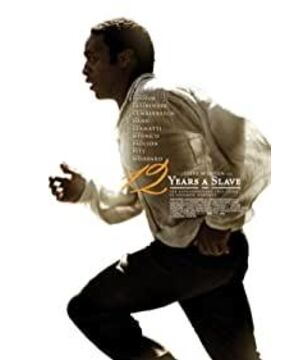But when this scene was specially portrayed, close-ups and heavy shots seemed to tell four words: When I want to be free, a tragic story is not just a few paragraphs and a few paragraphs of information, it starts to pull from the vivid and colorful pictures. The curtain opened, heavy and depressing.
The black Knopton was originally a man with a successful career and a happy family, but his happy life became completely unrecognizable after he was drunk and then sold.
When torture is added, traffickers will never allow you to shout: I am a free man.
The world seems to be turned upside down, as if being exiled from the Garden of Eden to the dark hell, as if thinking that he had burnt Aladdin's magic lamp, but actually summoned an ugly devil.
All these contrasts are unacceptable. Knopton just wanted to live, but now even survival is lingering and struggling, and all this is not what he did wrong. All the injustices are combined, but because he is a black man.
He constantly wanted to resist, even though he had suffered all kinds of unimaginable torture from the body to the spirit. I have been in danger of death several times, and have also witnessed the death and various punishments of other blacks: the blacks who were forced to wear sharp instruments of torture because of the wrong words, because they wanted to resist the blacks who were stabbed to death. Then, he wrapped his sack in a sack that he had discussed with him to escape recently, and threw it into the turbid ocean, watching the corpse get the so-called freedom to escape from the ship.
This dignified man has suffered all kinds of inhuman torture in the past twelve years, and he can't use any words to comfort him. When he is treated as a clown, if people want him to laugh, he has to laugh, and if people want him to dance, he has to dance, and there is no way to express anger. When he was tied up with his neck and hung from a branch, struggling to touch the ground with his toes, survived the sultry noon, and was watered by cold rain, almost dying, and struggling to survive. No one can solve this pain.
The child in the distance seemed completely numb, still running and jumping happily. It seems that what is being hung here is nothing, neither a person nor an object.
Not to mention heavy labor, crude food, simple shack. The farmer does not treat them as human beings.
Isn't it possible that this imprisoned and tightly connected life doesn't have the slightest exit, yes.
When he thought he had gotten a chance to escape, the more he thought about it, the more excited he became, the faster he ran, and he seemed to be about to run to the other side of freedom. It seemed that the torture, insult and damage could be thrown away immediately.
But he was reminded by the execution scene encountered halfway.
Freedom is just a cruel dream. He thinks he can go far, but in fact, he has never been able to get rid of the shackles on his feet, and he is tied tightly.
At that little exit, what awaited him is not necessarily freedom, more likely destruction.
The young Patsy could not bear all the insults and begged him: kill me, because you are a good person. And how can he bear it. But she might even die as alive.
Patsy is a young girl full of energy, thin, thin, fragile, and delicate. She was supposed to be a flower-like girl, but was whipped and disfigured at will. There seems to be no fun in her life.
Even death is a luxury.
For freedom, he never stopped fighting. He watched him accumulate the paint for writing little by little, dared to turn on the lamp, and then told his family about his situation. Every word is blood and hope. He wants freedom so much. The hope of freedom is his survival so far. The driving force behind even made him forget the ugliness, deception, and use of human nature. Then he was accused by a bastard who claimed to be a good man and took all the money he had worked so hard to save.
I was worried for him in that scene. Fortunately, despite the fear, he still used his super eloquence at this critical moment, and finally escaped. Watching him burn the letter frustratedly, his disappointment at losing his freedom even surpassed his fear of death.
However, although justice came too late, it finally came. After careful verification this time, he finally found someone willing to send him a letter. We should believe that faith and luck will support a person to go on.
This concludes the story of the movie.
The real story is still not over.
How much does it cost to get freedom as an expensive item?
After being a slave for twelve years, the body is free, will the mind be free? After regaining his freedom, the prototype of the story lived up to its promise and vigorously helped the black slaves who were sold. A few years later, they disappeared suddenly and there was no trace of their bones.
View more about 12 Years a Slave reviews











